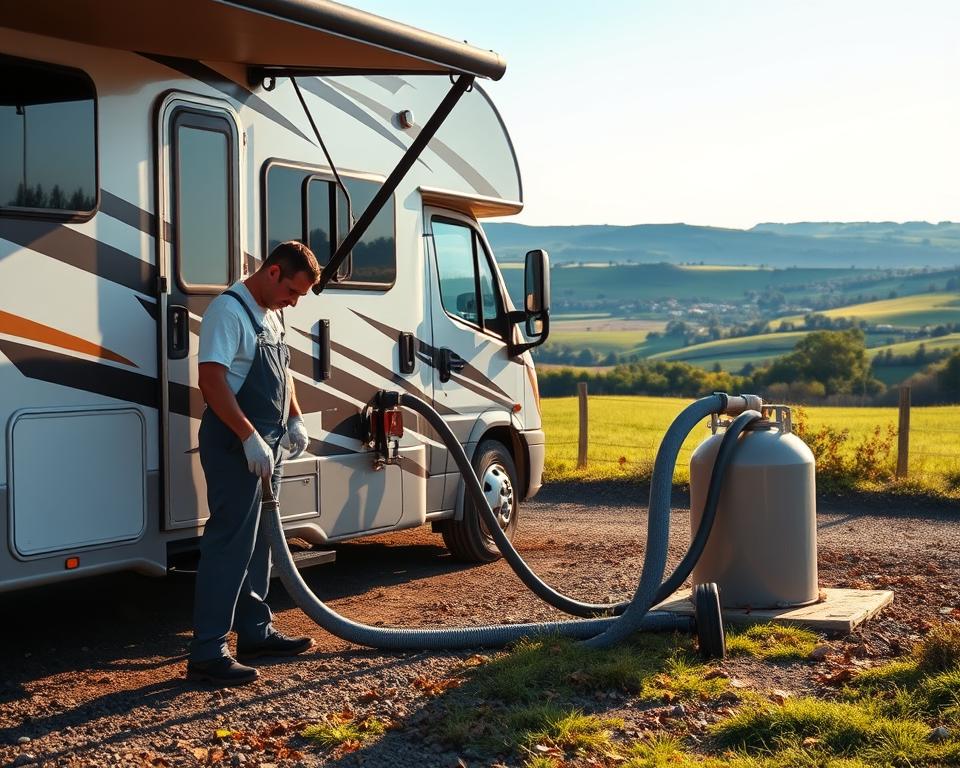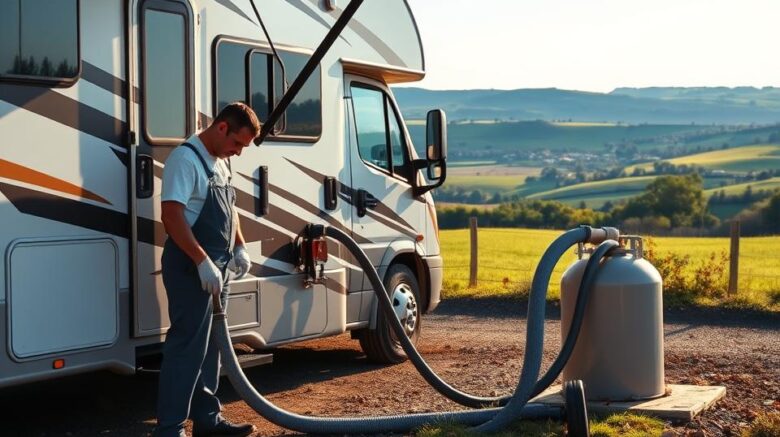Recreational Vehicle Waste Removal: Your Overview to Hassle-Free Dumping
Did you ever consider how your camper handles sewage while enjoying the wilderness? RV septic pumping is crucial, often more than you think. Ensuring your rig’s sanitation system functions properly is essential for seamless journeys. This guide explains RV waste systems, why tank emptying is necessary, and best practices for carefree adventures. With RV waste pump services from All in Sanitation, your trips can be as splendid as your destinations.
Significant Points
- Grasping RV sewage setups is essential for proper tank emptying.
- Regular septic pumping prevents unpleasant surprises during your travels.
- Implementing good routines boosts your RV’s sanitation durability.
- Count on All in Sanitation for trustworthy camper tank services.
- Monitoring tank levels guarantees a smooth RV adventure.
- Safe waste removal is fundamental to conscientious camping.
Getting to Know RV Sanitation Systems
RV waste systems are essential for efficient waste management on the road. These systems typically comprise black and gray water storage. The black tanks collect toilet waste. Gray water tanks manage dish and shower runoff. Knowing their operations improves waste management in your RV.
Proper upkeep of these components is crucial. Failing to pump the camper tanks regularly can cause clogs. Potentially ruining your outdoor excursions. Ensure regular checks to keep both tank types functioning well.
Relying on a reputable black water provider ensures correct dumping. Specialized RV treatments extend tank longevity and prevent odors. Maintaining your sanitation setup enriches your camping freedom.
Why You Need Regular RV Septic Service
Routine septic service ensures a clean and efficient RV. Neglecting wastewater management leads to foul smells, blockages, and system breakdowns. Waste buildup is a health hazard due to bacteria and contamination. Keeping up with maintenance is thus crucial.
Using a professional service like All in Sanitation ensures eco-friendly waste disposal. Their expertise guarantees safe, efficient handling of your waste. Staying on top of septic servicing keeps your trips worry-free. This practice preserves your adventures by sidestepping septic pitfalls.
When to Empty Your RV Tanks
How often you empty tanks influences your RV’s sanitation. It ensures your journey remains uninterrupted. Your pumping schedule depends on occupancy, tank capacity, and usage patterns.
For occasional RV users, it’s best to pump the black water tank every 3-5 days. Full-time campers often require more frequent dumping. Keeping an eye on your gauge refines your servicing schedule.
Chemical treatments are useful for determining when to pump. Following these guidelines protects your sanitation apparatus. Avoiding overflows preserves your RV’s plumbing and cleanliness.

Options for RV Tank Dumping
Several effective methods exist for RV septic pumping, catering to different preferences. A macerator pump grinds waste into slurry creating a slurry for easier disposal. It enables smooth transfers to dump points. Many choose it for its speed and simplicity.
Home septic dumping allows for emptying the RV’s holding tank directly into a residential septic system. It’s essential to verify local regulations to avoid non-compliance with waste disposal laws. This method is both environmentally safe and directly manages RV waste when properly used.
Gravity dumping uses gravitational force to release waste into a cleanout port, being the most straightforward method. Each method for RV septic pumping presents unique pros and cons. By understanding these, RV owners can select the most suitable option for their needs, ensuring effective waste management.
Essential RV Dumping Gear
Effective RV septic pumping requires appropriate tools. A durable sewer hose links your RV to disposal sites. It must be both durable and flexible for easy maneuvering. A good sewer hose simplifies waste disposal, making it less of a hassle.
Include a macerator pump in your gear list. They convert solids into liquid for easier dumping. They’re particularly useful where gravity can’t aid the emptying process.
It’s crucial to maintain your RV septic pumping gear. Rinse equipment after every job to prevent buildup. Proper storage guarantees readiness. Well-maintained gear ensures clean and smooth emptying.
Top Tips for RV Sewer Maintenance
Maintaining a clean and efficient RV waste system is crucial for a pleasant travel experience. Adhere to these tips for spotless sanitation. Start by always dumping black water first, then follow with gray water. This process uses the cleaner water to flush out the tanks, preventing clogs and buildup.
Choose enzyme or bacterial additives for superior breakdown. They maintain a balanced microbial ecosystem in your tanks. Stay away from harsh chemicals as they can kill the beneficial bacteria, reducing the system’s effectiveness.
Consistently rinsing tanks, hoses, and connectors is key to avoiding odors and blockages. Employing a dedicated sewer hose for black water use is a wise choice. This habit enhances overall sanitation hygiene.
Follow this routine to streamline sewer cleaning:
- Dump black water first, then gray water.
- Use enzyme and bacteria treatments regularly.
- Skip bleach and strong disinfectants.
- Rinse tanks, hoses, and connectors after every use.
- Perform periodic system inspections to spot problems.
Following these steps, RV owners can improve the life span and functionality of their wastewater systems. This leads to more enjoyable road trip experiences.
Upkeep for Trailer Septic Systems
Similar to RVs, mobile homes need regular septic care for lasting performance. Timely maintenance helps avoid costly fixes and downtime. It is recommended to pump the tank every three to five years, depending on how much you use it and its size.
Effective disposal methods are key to maintaining your septic system. Make sure to dispose of all waste and chemicals properly. Biodegradable solutions and level monitoring minimize harm. Harsh chemicals should be avoided as they harm the microbes that break down waste.
Scheduling regular professional inspections can catch potential problems early. These check-ups ensure your peace of mind by identifying issues before they worsen, thus maintaining smooth operation. Following these guidelines keeps your home septic in peak shape.
Camper Waste Dumping Advice
Effective trailer wastewater disposal is essential for a smooth RV experience. Locate approved dumping spots before departure. Verify legal compliance to prevent penalties and eco-harm. Opting for RV-friendly products can enhance the tanks’ condition, facilitating efficient camper tank pumping.
Flushing with clean water helps clear tanks completely. Flushing tanks with water ensures complete emptying, averting the risk of waste residue. This residue can cause odors and blockages. Moreover, it supports an eco-friendly disposal method.
Advance planning is vital. By organizing your stops at disposal stations as per your travel plans, you can reduce hassle. Coordination makes emptying more efficient. Some useful tips for waste disposal include:
- Regularly monitor tank levels to decide when pumping is needed.
- Apply enzyme or bacteria-based solutions to decompose waste and boost tank performance.
- Always wear gloves and clean hands post-drainage gear handling.
Understanding RV Holding Tank Treatment
Your RV’s sanitation system depends on effective tank treatments. Formulations contain targeted microbes and enzymes. They aim to break down waste effectively. Using them regularly stops bad odors and ensures tanks stay clear, boosting overall performance.
Adding bio-treatments fosters a healthy septic ecosystem. They accelerate the natural decomposition process. Less frequent emptying prolongs service intervals.
When selecting an RV holding tank treatment, consider your motorhome’s requirements. Products vary significantly. Opt for green, home-compatible formulas. They ensure efficient waste processing and enhance your RV’s waste management system.
| Treatment Form | Active Ingredients | Advantages |
|---|---|---|
| Liquid Formulas | Bio-catalysts | User-friendly; powerful decomposition |
| Powdered Solutions | Enzymes | Cost-effective; long shelf life |
| Tablet Treatments | Pre-measured cultures | Hassle-free; exact dosing |
Common Mistakes to Avoid During Pumping
Campers often stumble on simple dumping mistakes. Skipping regular pumping leads to surprises. Resulting in overflow and malfunctions. Additionally, the incorrect use of chemicals can damage the septic system. Leading to costly fixes and downtime.
Dumping tanks out of sequence is a typical error. The sequence is crucial, especially for black water service. Failing to dump the black water before the gray can result in cross-contamination and foul odors. It’s also vital not to open the septic tank access lids during home dumping. Leave complex dumping tasks to experts for safety.
Moreover, neglecting equipment maintenance can cause leaks or clogs. Routine gear care supports clean, effective dumping. Avoiding these pitfalls simplifies your outdoor experience. And keeps campsites fresh and hygienic.
To Conclude
An in-depth guide on RV septic pumping is vital for RV or mobile home owners. They pave the way for hassle-free travels. Regular maintenance and understanding your waste system can enhance your travels significantly. Using proper disposal techniques and having necessary tools will lead to worry-free adventures.
Choosing All in Sanitation for septic services grants tranquility. Their skilled team manages waste with precision and care. Thus, you can immerse yourself in the joy of your travels and craft unforgettable moments.
Routine tank emptying is fundamental to conscientious camping. It combines the spirit of exploration with the assurance of a tidy, odor-free environment. Ensuring every road trip remains clean and enjoyable.
